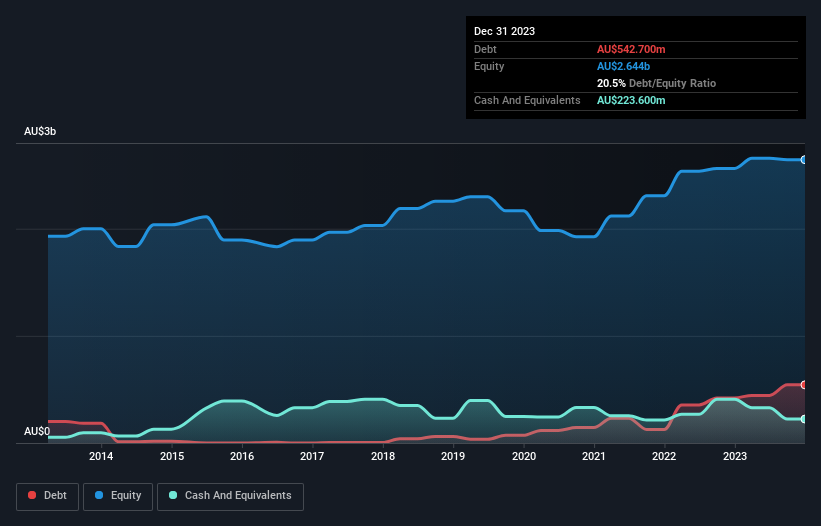Howard Marks put it nicely when he said that, rather than worrying about share price volatility, 'The possibility of permanent loss is the risk I worry about... and every practical investor I know worries about.' So it might be obvious that you need to consider debt, when you think about how risky any given stock is, because too much debt can sink a company. We can see that Sims Limited (ASX:SGM) does use debt in its business. But the more important question is: how much risk is that debt creating?
Why Does Debt Bring Risk?
Debt is a tool to help businesses grow, but if a business is incapable of paying off its lenders, then it exists at their mercy. If things get really bad, the lenders can take control of the business. While that is not too common, we often do see indebted companies permanently diluting shareholders because lenders force them to raise capital at a distressed price. Of course, plenty of companies use debt to fund growth, without any negative consequences. The first step when considering a company's debt levels is to consider its cash and debt together.
See our latest analysis for Sims
How Much Debt Does Sims Carry?
You can click the graphic below for the historical numbers, but it shows that as of December 2023 Sims had AU$542.7m of debt, an increase on AU$421.0m, over one year. On the flip side, it has AU$223.6m in cash leading to net debt of about AU$319.1m.

A Look At Sims' Liabilities
According to the last reported balance sheet, Sims had liabilities of AU$1.08b due within 12 months, and liabilities of AU$1.03b due beyond 12 months. Offsetting this, it had AU$223.6m in cash and AU$769.1m in receivables that were due within 12 months. So it has liabilities totalling AU$1.13b more than its cash and near-term receivables, combined.
This deficit isn't so bad because Sims is worth AU$2.45b, and thus could probably raise enough capital to shore up its balance sheet, if the need arose. But it's clear that we should definitely closely examine whether it can manage its debt without dilution. There's no doubt that we learn most about debt from the balance sheet. But it is future earnings, more than anything, that will determine Sims's ability to maintain a healthy balance sheet going forward. So if you're focused on the future you can check out this free report showing analyst profit forecasts.
In the last year Sims had a loss before interest and tax, and actually shrunk its revenue by 5.4%, to AU$8.4b. We would much prefer see growth.
Caveat Emptor
Importantly, Sims had an earnings before interest and tax (EBIT) loss over the last year. To be specific the EBIT loss came in at AU$56m. Considering that alongside the liabilities mentioned above does not give us much confidence that company should be using so much debt. Quite frankly we think the balance sheet is far from match-fit, although it could be improved with time. Surprisingly, we note that it actually reported positive free cash flow of AU$31m and a profit of AU$146m. So one might argue that there's still a chance it can get things on the right track. When analysing debt levels, the balance sheet is the obvious place to start. But ultimately, every company can contain risks that exist outside of the balance sheet. For instance, we've identified 2 warning signs for Sims that you should be aware of.
If, after all that, you're more interested in a fast growing company with a rock-solid balance sheet, then check out our list of net cash growth stocks without delay.
New: Manage All Your Stock Portfolios in One Place
We've created the ultimate portfolio companion for stock investors, and it's free.
• Connect an unlimited number of Portfolios and see your total in one currency
• Be alerted to new Warning Signs or Risks via email or mobile
• Track the Fair Value of your stocks
Have feedback on this article? Concerned about the content? Get in touch with us directly. Alternatively, email editorial-team (at) simplywallst.com.
This article by Simply Wall St is general in nature. We provide commentary based on historical data and analyst forecasts only using an unbiased methodology and our articles are not intended to be financial advice. It does not constitute a recommendation to buy or sell any stock, and does not take account of your objectives, or your financial situation. We aim to bring you long-term focused analysis driven by fundamental data. Note that our analysis may not factor in the latest price-sensitive company announcements or qualitative material. Simply Wall St has no position in any stocks mentioned.
About ASX:SGM
Sims
Engages in buying, processing, and selling of ferrous and non-ferrous recycled metals in Australia, China, India, Thailand, Turkey, the United States, and internationally.
Undervalued with proven track record.
Similar Companies
Market Insights
Community Narratives



